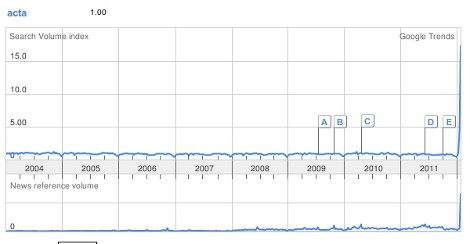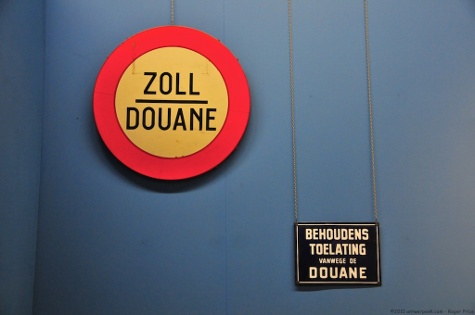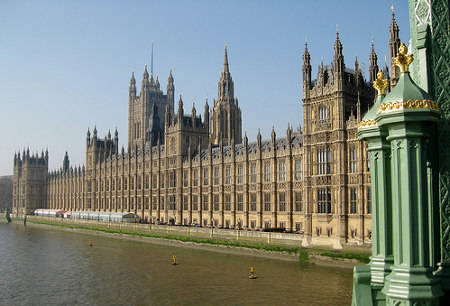After months of intense debate in the EU Council and the EU Parliament’s Legal Affair’s Committee (JURI), the European Parliament was scheduled to have its fist plenary session on the EU Patent Package (Unitary Patent Regulation, Language Regime Regulation, Unified Patent Court Agreement) on coming Wednesday, 14 February 2012.
While Google Search still delivers an entry “Plenary sitting – European Parliament Tuesday, 14 February 2012 Draft agenda. 09:00 – 10:20 Debates. European patent. Creation of unitary patent protection.“, the final draft agenda now announces a Fisheries debate instead.
As reported earlier, the public debate on the Anti-Counterfeiting Trade Agreement between the European Union and its Member States, Australia, Canada, Japan, the Republic of Korea, the United Mexican States, the Kingdom of Morocco, New Zealand, the Republic of Singapore, the Swiss Confederation and the United States of America (ACTA) is currently gaining momentum. One of the many problems with ACTA is that it appears not to be clear as to whether or not the Treaty will actually change the law of at least some of its Member states.
In this context it appears to be worthwhile to bring back into memory that – unlike the SOPA and PIPA Bills recently stalled in the U.S. – ACTA is a Treaty of public international law, not civil law or public national law. The Articles thereof clearly address not individuals or corporations but its Member States (‘Parties’) and imposes on them an obligation to uphold certain minimum standards with regard to enforcement of intellectual property law. Article 2 Para. 1 of ACTA reads [emphasis added]:
Each Party shall give effect to the provisions of this Agreement. A Party may implement in its law more extensive enforcement of intellectual property rights than is required by this Agreement, provided that such enforcement does not contravene the provisions of this Agreement. Each Party shall be free to determine the appropriate method of implementing the provisions of this Agreement within its own legal system and practice.
In this context it does not come as a surprise that in some of the ACTA signatory states some (if not many) of the provisions provided by ACTA are already in force. For example, in Germany the first Act on Product Piracy (“Produktpirateriegesetz”) dates back to March 07, 1990. It introduced, inter alia, a right to information addressing the infringer to disclose otherwise confidential information concerning the act of infringement as well as provisions to seize and destroy counterfeit goods. Today, in the EU the laws governing the enforcement of intellectual property right in general and especially the fight against piracy are widely harmonised by secondary EU law.
Continue reading »
As should be well known to everyone working on patents, copyright, trade marks and the like, the Anti-Counterfeiting Trade Agreement (ACTA) is a plurilateral agreement for the purpose of establishing international standards for intellectual property rights enforcement. In an earlier post on this blog I had reported in October last year on preparations for signing and ratification of ACTA in the EU, predicting that an epic battle on the ratification of ACTA is looming. Meanwhile, the Agreement has been signed on behalf of 31 Member States and on behalf of the EU as well.
It is absolutely safe to state that the public debate on ACTA has not calmed down. To the contrary, tensions are soaring as demonstrated by the Google Trends graph shown above: Just in these weeks and days the public interest in ACTA related matters as perceived by Google search engine has increased dramatically; look at the leading slope near the right-hand border of the plot. Fueled by real or imaginative parallels to the SOPA and PIPA Bills recently stalled in the U.S., broader circles of those parts of the general public engaged in Internet politics had a closer look into the ACTA matter, and many were not amused. Twitter timelines are buzzing with statements of discontent concerning ACTA; in Germany, protest demonstrations are scheduled to happen on February 11, 2012. In Poland, protest demonstrations with tens of thousands of participants have already been reported during past days (see also another video here).On January 26, Mr Kader Arif, the rapporteu for ACTA in the respective Committee of the European Parliament, stepped down, dismissing the entire political process of the creation of ACTA as follows:
“I condemn the whole process which led to the signature of this agreement: no consultation of the civil society, lack of transparency since the beginning of negotiations, repeated delays of the signature of the text without any explanation given, reject of Parliament’s recommendations as given in several resolutions of our assembly.”
As ACTA is considered to be a Mixed Agreement interfering with EU competences as well as with national ones it needs ratification not only by the EU Parliament on behalf of the European Union but also of each one of the 27 national Parliaments on behalf of each one of the EU Member States. Hence, starting later this year, we shall be entertained by watching a sort of a round dance of a political ratification theatre on a total of 28 stages including the European Parliament. And in many, if not in all EU Member States, a strong opposition will take the chance to push for a general debate on IP politics.
In some of the EU Member States the ACTA dispute may assist the respective national branch of the Pirate Party to enter the Parliament. Current polls on federal level say that the German branch of the Pirate Party may expect around 5% share of the votes for the lower chamber of the German Parliament (“Bundestag”). A broad grassroots movement fueld by protest against ACTA could well help them pass the 5% quorum hurdle. In view of the perceivable decay of the Liberal Democratic Party (“Freie Demokratische Partei”, FDP) which hangs around 3%, the German Piratenpartei might not only see chances to gain seats in the 2013 general elections but also to become junior coalition partner in a future German Government.

Absent of any reliable source the tea leaves give some cryptic clues: Munich on schedule, London delayed, Paris vanished?
The story so far. As we all know, the talks on the new EU-wide patent infrastructure (consisting basically of the Unitary Patent Regulation and the Unified Patent Court Agreement) run aground in late December despite quite some rounds of negotiations producing encouraging press releases according to which the so called ‘EU Patent Package’ was considered “broadly accepted in substance”. However, at the end of the Polish EU Presidency‘s half-year term, the adoption of the “Warsaw Patent Convention” – a term coined by Polish Deputy Prime Minister Pawlak – could not be celebrated as expected due to ongoing dissension.
Even though it was spread after the failed Competitiveness Council of December 5/6 through semi-official channels (e.g. tweets and press report) that the whole deal was almost done and only the seat of the central division of the Unified Patent Court remained to be decided, real doubts and harsh criticism almost immediately occurred and stakeholders saw an opportunity to again open the discussion on various substantive legal issues (see e.g. EPLAW resolution, FICPI position paper), such as on Articles 6 to 9 of the Regulation (effects of patents) that require substantive patent law to be subject to review by the CJEU.
Despite ongoing controversies and criticism (“desaster“, “bound to fail“) as to substantive issues, the politicians declared the dice cast for the Unitary Patent so that the Regulation was not unwrapped again for negotiations as to the legal merits. In fact, the Regulation for the Unitary Patent meanwhile got a green light from the powerful legal committee (JURI) of the EU Parliament in late December and the EU Council began to linguistically finalise the Regulation text in early January.
On May 30, 2011, the EU Council had published Document 10880/11 conveying a Proposal for a regulation of the European Parliament and of the Council concerning customs enforcement of intellectual property rights issued by the EU Commission under reference COM(2011) 285 final on May 26, 2011. The gist of this proposal was summarised within the Document as follows:
Continue reading »
José Manuel Durão Barroso, President of the European Commission, has delivered a Statement on the occasion of a meeting with Helle Thorning-Schmidt, Prime Minister of Denmark, on January 12, 2012:
The same goes for a common unitary patent in Europe! Frankly we are almost there; there are now some divisions between France, Germany and Britain on things that are not so difficult. We can finalise the Community patent that we have been discussing for 30 years so it is about time to come to a solution and I know that Denmark will put its influence to find a solution.
Apparently this is something like a morale-boosting slogan, a rallying call, pep talk. We shall wait and see what really will happen during the coming months of the Danish EU Presidency.
Meanwhile the European Scrutiny Committee of the UK House of Commons uttered concerns that some of the draft plans for a single EU-wide patent system could disadvantage UK small businesses, Out-Law.com reports.
In detail, the conclusions of the Committee were not very favourable:
Continue reading »
This is just a brief notice concerning the envisaged Regulation of the European Parliament and of the Council implementing enhanced cooperation in the area of the creation of unitary patent protection. As we all know, the past Polish EU Presidency was not successful in delivering a final compromise on one of the other main components of the EU patent package, the Agreement on the creation of a Unified Patent Court. At least the question of where to put the seat of the Central Division could not be answered, and other issues might be unresolved as well. The incoming Danish EU Presidency extending from January to July 2012 obviously is determined to carry on with that task.
Just now the linguistic secretariat of the EU Council has sent out Document CM 1068/12 conveying an invitation addressing the Jurists/Linguists Group of the Council, summoning Members thereof to meet on January 26, 2012, in order to finalize the text of the Regulation of the European Parliament and of the Council implementing enhanced cooperation in the area of the creation of unitary patent protection (PE-CONS 72/11 – 2011/0093 (COD)) from a legal and linguistic point of view.
In my view this is an indication that dice is cast with regard to the political issues surrounding the Regulation. We shall wait and see if the Danish Presidency also can surmount the obstacles still barring the partners of the enhanced cooperation from finding a political solution with regard to the UPC Agreement.
EU Patent Package: JURI has Spoken, But What did it Say? (UPDATE)
Yesterday the members of the EU Parliament’s Legal Affairs Committee (JURI) voted in three separate sessions on the EU patent package (see nos. 18 to 21 of agenda):
- Enhanced cooperation in the area of the creation of unitary patent protection, JURI/7/05848, Rapporteur: Bernhard Radkay (S&D).
- Enhanced cooperation in the area of the creation of unitary patent protection with regard to the applicable translation arrangements, JURI/7/05847, Rapporteur: Raffaele Baldassarre (PPE).
- Jurisdictional system for patent disputes, JURI/7/06168, Rapporteur: Klaus-Heiner Lehne (PPE).
Fitting into the parliamentary tradition of issuing celebrating press releases when it comes to the future EU patent system, like
- A step closer to an EU patent (22 Nov 2011) or
- Done deal on the EU patent? (01 Dec 2011),
yesterday’s post-vote press statement was titled
- EU patent gets Legal Affairs Committee green light (20 Dec 2011),
disclosing, besides the well-known mantras as to the beneficial effects of the new European patent system, the liberating message that
Legal Affairs Committee MEPs backed a political deal struck last 1 December between Parliament and Council negotiators on the so-called “EU patent package” [...]. If Parliament as a whole and the Council confirm the deal, a new EU patent will be created.
Recently I spotted an entry for Document 15856/11 in the Public Register of the EU Council. The paper is titled OPINION OF THE LEGAL SERVICE – Draft agreement on the European Union Patent Jurisdiction (doc.13751/11) – compatibility of the draft agreement with the Opinion 1/09 and marked confidential (“LIMITE“). After having filed a request based on Regulation (EC) No 1049/2001 of the European Parliament and of the Council of 30 May 2001 regarding public access to European Parliament, Council and Commission documents I was served with a heavily redacted version of the requested Document.
In the effect, all significant portions of the Document were deleted. The only real disclosure is to be drawn the introductory narrative:
At the Competitiveness Council on 29 September 2011 the Legal Service was asked about the compatibility with Opinion 1/091 of the Court of Justice of the European Union (the “Court of Justice”) of a draft agreement on the European Union Patent Jurisdiction (hereinafter “the current draft agreement”), elaborated by the Presidency of the Council in September 20112. This contribution further develops and constitutes a written version, requested by the Council, of the statement made orally at that meeting.
Continue reading »
When Poland took over the EU Council Presidency in summer, the incoming Polish Presidency emphasised in a Note its determination to wisely utilise the “momentum for finalising the legislative processes” and “to continue the work in parallel on both [creation of unitary patent protection and creation of a unified patent litigation system], with a view to reaching an overall political agreement within the Council at the end of this year”.
In November, the Polish Presidency announced in Document 17539/11 its intention to organise an initialling ceremony whereby the text of the Unitary Patent Court Agreement could be finalised in Warsaw on 22 December 2011 (see also here). As the Competitiveness Council meeting on 5 December 2011 ended with the positive news that only the seat of the Central Division of the Unitary Patent Court remains to be decided, hopes increased that the new European Unitary Patent may become reality by the end of this months, when Poland will pass the Presidency baton over to Denmark.
The k/s/n/h::law blog
Some of the patent attorneys of the KSNH law firm have joined their efforts to research what is going on in the various branches of IP law and practice in order to keep themselves, their clients as well as interested circles of the public up to date. This blog is intended to present results of such efforts to a wider public.
Blog Archives
- November 2013 (2)
- October 2013 (1)
- September 2013 (1)
- August 2013 (2)
- July 2013 (3)
- June 2013 (5)
- March 2013 (5)
- February 2013 (4)
- January 2013 (5)
- December 2012 (5)
- November 2012 (5)
- July 2012 (5)
- June 2012 (8)
- May 2012 (5)
- April 2012 (3)
- March 2012 (4)
- February 2012 (5)
- January 2012 (6)
- December 2011 (12)
- November 2011 (9)
- October 2011 (9)
- September 2011 (4)
- August 2011 (7)
- July 2011 (4)
- June 2011 (1)
Blog Categories
- business methods (6)
- EPC (7)
- EPO (12)
- EU law (92)
- ACTA (8)
- CJEU (4)
- Comitology (1)
- competition law (2)
- Enforcement (6)
- EU Unified Patent Court (62)
- FTA India (1)
- TFEU (2)
- Trade Marks (5)
- European Patent Law (37)
- German Patent ACt (PatG) (1)
- German patent law (5)
- Germany (6)
- Pirate Party (3)
- International Patent Law (4)
- PCT (2)
- IP politics (10)
- licenses (2)
- Litigation (5)
- Patentability (7)
- Patents (12)
- Piratenpartei (2)
- Software inventions (10)
- Uncategorized (9)
- Unitary Patent (24)
- US Patent Law (4)
Comments
- kelle on Germany: Copyright Protection More Easily Available For Works Of “Applied Arts”
- Time Limits & Deadlines in Draft UPCA RoP: Counting The Days - KSNH Law - Intangible.Me on Wiki Edition of Agreement on Unified Patent Court Agreement (UPCA)
- Time Limits & Deadlines in Draft UPCA RoP: Counting The Days | ksnh::law on Wiki Edition of Agreement on Unified Patent Court Agreement (UPCA)
- Wiki Edition of Agreement on Unified Patent Cou... on Wiki Edition of Agreement on Unified Patent Court Agreement (UPCA)
- European Commission Takes Next Step Towards Legalising Software Patents in Europe | Techrights on EU Commission publishes Proposal of amendend Brussels I Regulation for ensuring Enforcement of UPC Judgements
Blogroll
- 12:01 Tuesday
- America-Israel Patent Law
- Anticipate This!
- AwakenIP
- BlawgIT
- BLOG@IPJUR.COM
- BP/G Radio Intellectual Property Podcast
- Broken Symmetry
- Class 46
- Director's Forum: David Kappos' Public Blog
- Gray on Claims
- I/P UPDATES
- IAM Magazine Blog
- Intellectual Property Intelligence Blog
- IP Asset Maximizer Blog
- IP CloseUp
- IP Dragon
- IP Watch
- IP Watchdog
- IPBIZ
- ipeg
- IPKat
- ITC 337 Law Blog
- Just a Patent Examiner
- K's Law
- MISSION INTANGIBLE
- Patent Baristas
- Patent Circle
- Patent Docs
- Patently Rubbish
- PatentlyO
- Patents Post-Grant
- Reexamination Alert
- SPICY IP
- Tangible IP
- The 271 Patent Blog
- The Intangible Economy
- THE INVENT BLOG®
- Think IP Strategy
- Tufty the Cat
- Visae Patentes
The KSNH blogging landscape


This blog and the German-language sister blog k/s/n/h::jur link to the two popular and privately run blogs IPJur und VisaePatentes and continue their work and mission with a widened scope and under the aegis of our IP law firm.
ksnhlaw on Twitter
- No public Twitter messages.
 KSNH::JUR Feed (german)
KSNH::JUR Feed (german)- Ist Verschlüsselung passé? September 6, 2013Auf verschiedenen Feldern beruflicher Praxis ist dafür zu sorgen, dass Kommunikation vertraulich bleibt. Die trifft beispielsweise für Ärzte zu, aber auch für Anwälte, darunter auch Patentanwälte. Einer der zahlreichen Aspekte, die in diesem Zusammenhang eine Rolle spielen, ist die Technik, um die Vertraulichkeit beruflicher Kommunikation sicherzustellen. Wa […]
- EU-Einheitspatent: Demonstrativer Optimismus und Zahlenmystik allerorten – Naivität oder politische Beeinflussung? June 26, 2013Nach mehreren vergeblichen Anläufen zur Schaffung eines EU-weiten Patentsystems wurde 1973 als Kompromiss das Europäische Patentübereinkommen unterzeichnet, welches unabhängig von der seinerzeit noch EWG genannten Europäischen Union System zur zentralisierten Patenterteilung mit nachgeordnetem Einspruchsverfahren durch das Europäische Patentamt schuf. Wie wi […]
- Moderne Zeiten oder: DPMA und Patentgericht streiten über die elektronische Akte April 25, 2013Bekanntlich hat das Deutsche Patent- und Markenamt (DPMA) im Jahre 2013 mit der rein technischen Fertigstellung der Einrichtungen zur elektronischen Akteneinsicht einen wichtigen Meilenstein seines Überganges von der Papierakte zur “elektronischen Akte” erreicht. Im DPMA werden aber bereits seit dem 01. Juni 2011 Patente, Gebrauchsmuster, Topografien und erg […]
- Gutachten zu Forschung, Innovation und technologischer Leistungsfähigkeit Deutschlands 2013 March 11, 2013Unter dem Datum vom 28. Februar 2013 ist die Bundestags-Drucksache 17/12611 veröffentlicht worden Sie trägt den Titel Unterrichtung durch die Bundesregierung - Gutachten zu Forschung, Innovation und technologischer Leistungsfähigkeit Deutschlands 2013. Die Bundesregierung legt dem Deutschen Bundestag seit dem Jahr 2008 […]
- 3D-Printing: Zum Filesharing von 3D-Modelldaten February 25, 2013In meiner kleinen zuvor angekündigten Reihe über rechtliche Aspekte des 3D Printing komme ich heute auf die Frage zu sprechen, ob die Hersteller von Gerätschaften es hinnehmen müssen, wenn Ersatztreile davon – vom Brillengestell über Smartphone-Gehäuseteile bis hin zu Rastenmähermotor-Abdeckungen – gescannt und die daraus […]
- Ist Verschlüsselung passé? September 6, 2013










